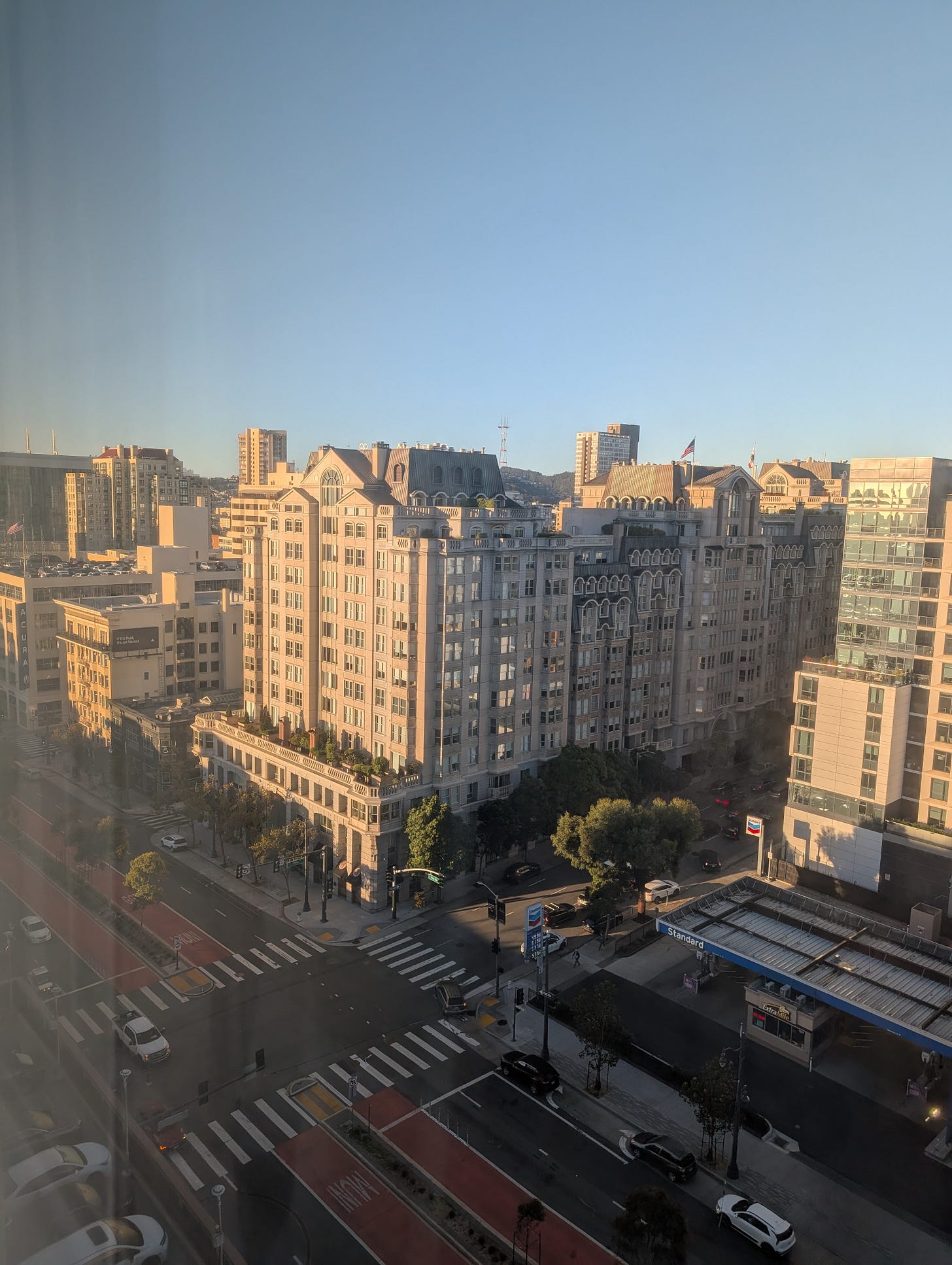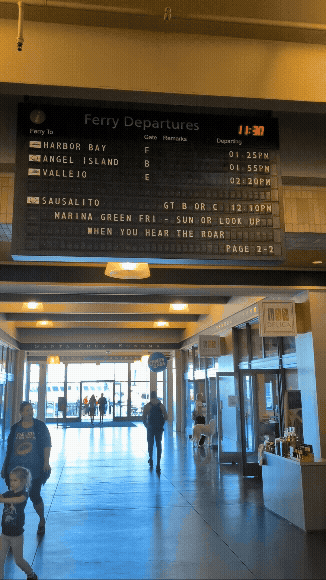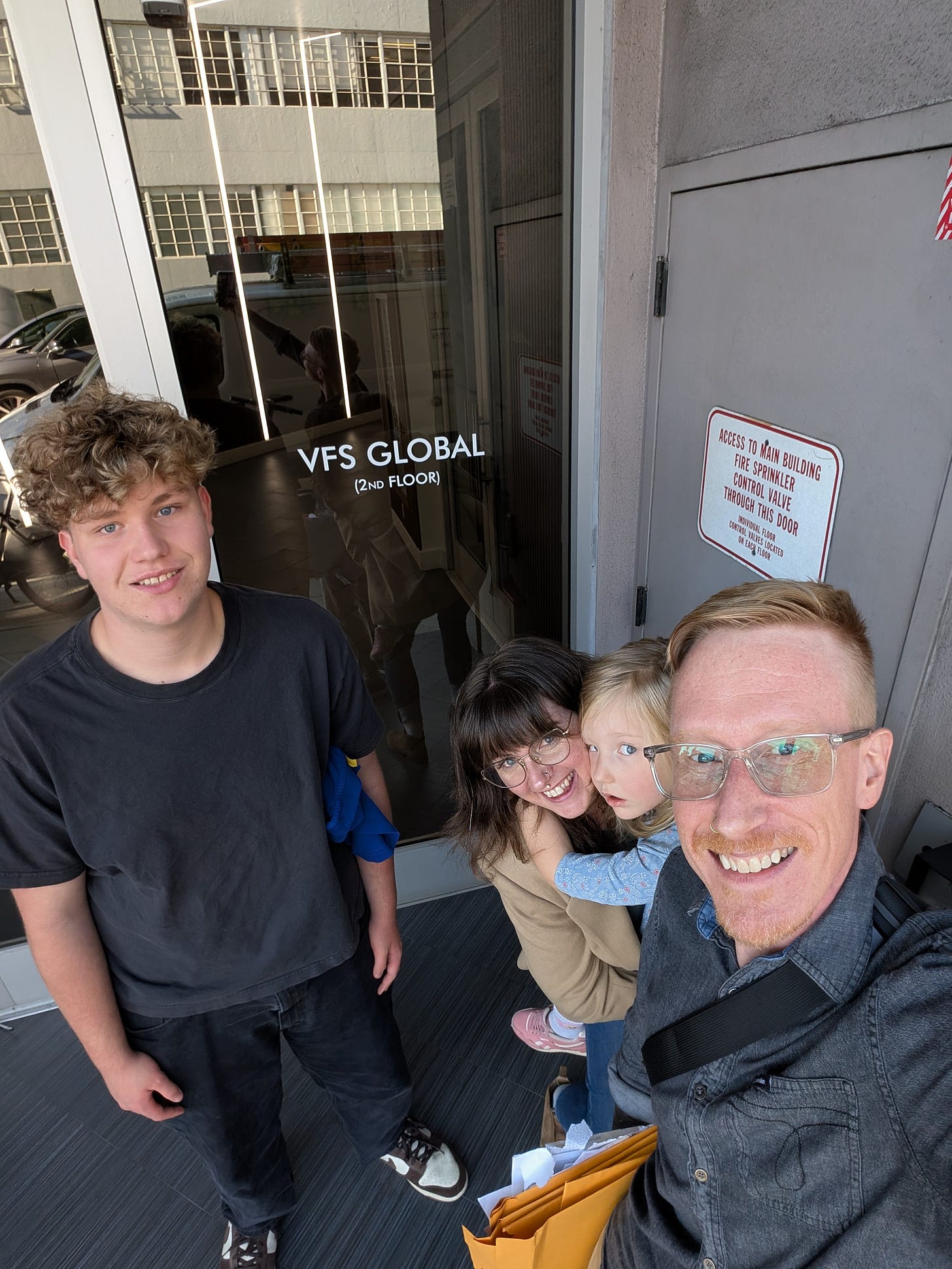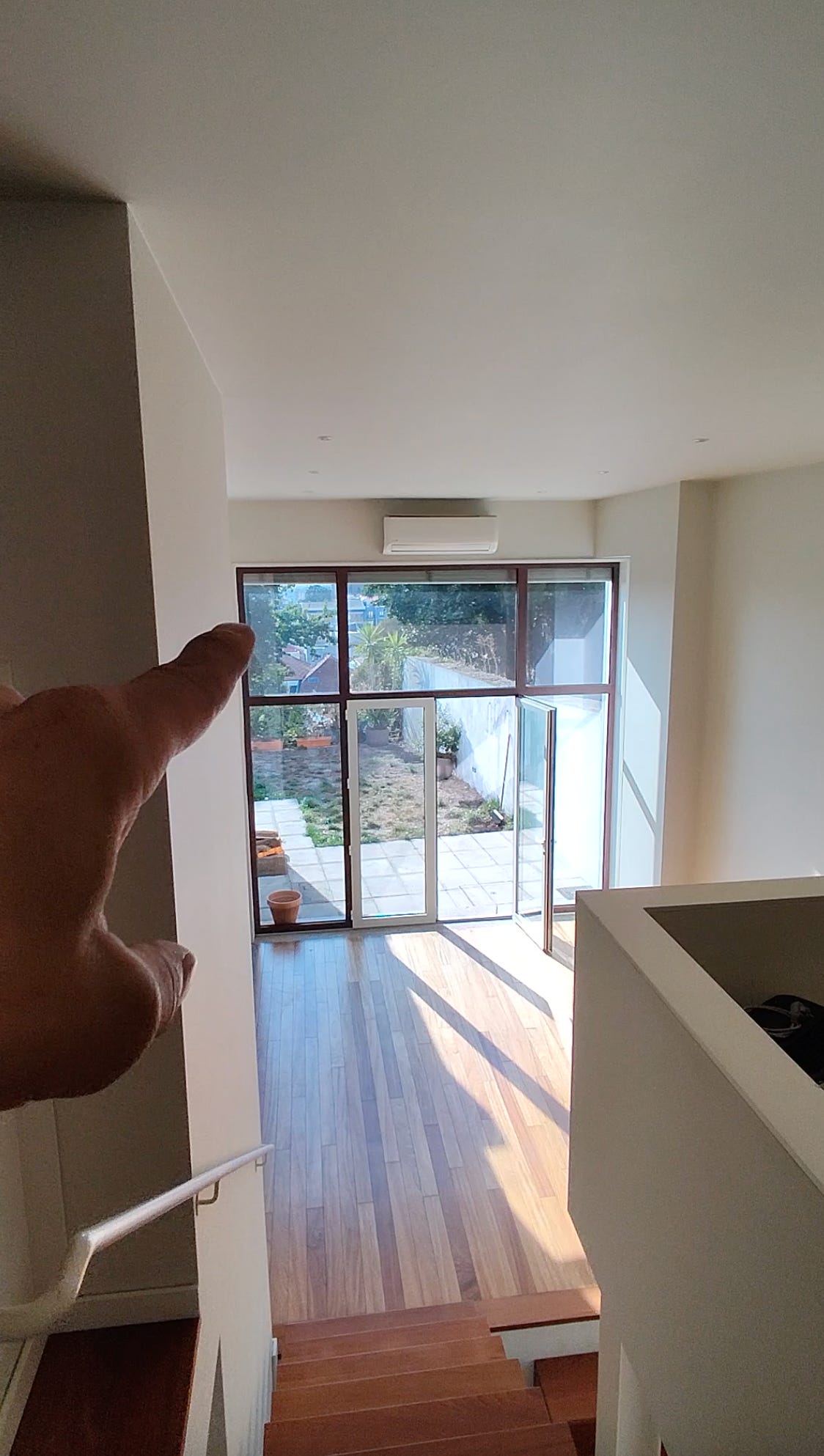Pending Approval
The Quiet Between Updates
San Francisco has a way of reminding you that even modest plans come with luxury pricing. Our family of four shared a single hotel room with two full beds. I had used our traveler points to stretch the budget, finding something on the quieter north end of the city. It was not glamorous, but it was clean, and at this stage of the visa process that counted as a win.
The only real misstep was breakfast. I had paid extra to have it “included,” only to learn at check-in that the offer covered two adults and, by their rules, our fifteen-year-old son counted as a third. Each additional breakfast was thirty-eight dollars. We tried it once, figuring we might as well see what thirty-eight dollars of scrambled eggs and toast tasted like. The next morning, we skipped it altogether and went somewhere actually good for about the same price. Lesson learned: never trust a hotel that lists “buffet” as if it were an act of generosity.
Sleep had been scarce from the start. Cora had picked up a cough just before the trip, and her snoring filled the room with a steady rhythm of tiny earthquakes. By the time the sun came up, we all looked like we had survived a natural disaster. Still, there was no room for fatigue. Today was the appointment.
On the desk sat four thick manila folders, the kind that looked official even when they were bursting at the seams. Inside were the color-coded labels that had come to define my sanity: eight shades dividing our lives into bureaucratic categories. Lease agreements, apostilles, insurance verifications, and passport copies, each tucked neatly behind its assigned tab. I had borrowed the idea from a random Reddit comment months ago, where someone swore that color-coding their documents was the one trick that saved them from disaster. They were right.
By that morning, though, the folders had become sacred artifacts. Katy and I had checked, double-checked, and triple-checked every page until the act itself felt superstitious. Opening them again would only invite the possibility of losing something vital. So we left them closed, waiting quietly on the desk, while we pretended this was just another family vacation.
I had mapped out our morning to keep the nerves from catching up. We walked through the Ferry Building, grabbed coffee, and ate Filipino food by the water. The air carried the smell of vinegar and grilled meat, sharp and comforting at once, the kind of scent that makes you imagine what mornings could be like if you could actually afford to live in one of the most expensive metros in the world. Then it was back to the hotel, one final sweep of the room, one last look at the folders, and into an Uber headed toward the VFS Global office.
The appointment was a blur of polite panic. Our consulate agent was calm and efficient, and English seemed to be her second language. I was sweating through my shirt before we had even begun, fumbling for the right papers each time she spoke. Her questions came quickly, and I could feel the edges of impatience forming. Then Katy leaned in beside me, perfectly composed, and slid the next document forward with her freshly manicured nails. The agent paused, glanced down, and smiled faintly, two women recognizing in each other the small power of self-care under fluorescent lights. The tension lifted just enough for me to breathe again.
Unexpectedly, we were asked to surrender our physical passports. Our attorneys had assured us that notarized copies would be enough, but a new notice dated August 15 informed applicants that originals were now required. We handed them over with quiet reluctance, watching as they disappeared into the growing stack behind the counter. The quoted timeline was six to eight weeks, which aligned, if barely, with our target departure of December 19.
And just like that, it was done. Stamps, signatures, polite nods. A small moment of disbelief as we stepped outside and realized that months of anxiety had been reduced to a few crisp pages now in someone else’s hands.
That night, we opened a bottle of wine in the hotel room and let the exhaustion finally settle in. The long, grinding maze of preparation was behind us. Yet as I stared at the lights of the city through the window, my mind refused to rest.
Life in Motion had begun as a guide for those following along on this immigration journey, a way to document each step so others might learn from it. But somewhere along the way it had become something more, a place where I wrestled with the moral, social, and political questions orbiting around this moment in history. And now that the logistics were mostly done, I found myself wondering whether my words still mattered.
I had already said so much. Written the checklists, shared the lessons, poured out the exhaustion. What else was there to add? Or maybe I was just afraid, afraid of oversharing in a time when truth itself felt fragile.
I poured another glass of wine and told myself I would think about it in the morning.
The Sound of a Muzzled Democracy
The morning after our appointment, the city felt almost weightless. For the first time in months, there was nothing left to prepare, no document to notarize, no checklist to refresh. I had imagined that freedom would feel louder. Instead, it came as a kind of stillness, a silence filled only by the hum of traffic and the faint clatter of the ice machine down the hall.
The Antifa order had already been in effect for weeks by then. Signed back on September 22, it had slipped into the background of American life the way so many alarming things do, loud at first, then dull from repetition. It labeled “Antifa” a domestic terrorist organization, a term so loosely drawn that it could stretch over anyone holding a protest sign. Civil-liberties lawyers were still arguing that there is no legal mechanism in the United States to designate a domestic group as “terrorist,” but the damage was done. The phrase had entered the bloodstream. It was already being used in press briefings and campaign speeches, a new shorthand for “anyone who disagrees with us.”
That same week, Senator Rubio’s name kept surfacing beside a different kind of punishment. Under his oversight, the State Department had begun revoking visas for foreign nationals whose speech was considered hostile to the United States. The examples kept multiplying: student activists, artists, and then, just days before our appointment, the now-famous six whose visas were pulled after they posted comments about Charlie Kirk’s assassination. None of them had threatened anyone; they had simply spoken, crudely perhaps, but freely. And now they were gone, erased from the country by the stroke of a bureaucrat’s pen.
Technically, these were foreigners. It was not my passport at risk. But it felt closer than it should have. The idea that speech could now be weighed for its loyalty made me wonder how long before the same logic reached the rest of us. It did not matter that I was planning to leave. Until that visa arrived, I was still tethered to a system that could make words feel like evidence.
I noticed the change in myself first. When writing drafts for Life in Motion, I began pausing halfway through a sentence, questioning whether to finish it. I told myself I was only editing for tone, for clarity, for empathy. But what I was really doing was trimming the truth into something less combustible.
Every night that week, my news feed seemed to loop the same refrain: “radical left,” “un-American,” “domestic extremist.” Ordinary policies, healthcare subsidies, climate funding, education, had been recast as extremism. The party that once preached small government now wanted a larger government to decide who deserved the title of patriot.
It all started to sound normal. The talking points, the executive orders, the visa revocations. They slid into the daily scroll between sports scores and celebrity headlines until outrage felt impolite. Somewhere along the line, silence had been repackaged as maturity, as if choosing not to speak were the same thing as wisdom.
I kept thinking of our passports, sealed away in a consulate drawer, their pages blank but suddenly symbolic. For the first time, they felt less like documents of identity and more like permissions, fragile, conditional, and easily withdrawn.
And perhaps that is what unsettled me most. Soon, I would be a migrant too. In a world leaning hard toward far-right conservatism, it was a reminder that privilege can be circumstantial and temporary. Leaving did not exempt us from the tide; it only changed which shore we would face it from.
Maybe this is how it always begins. Not with a decree or a wall of soldiers, but with a quiet understanding that it is safer not to test the boundaries of your own voice.
Manufactured Ignorance
Silence does not exist in a vacuum. It has architects.
If the last decade has taught us anything, it is that silence can be manufactured as easily as outrage. We live in an economy of noise so overwhelming that most people mistake exhaustion for neutrality. When everything feels political, opting out begins to feel like wisdom.
But silence is not neutral. It is an inheritance carefully engineered by those who profit from confusion.
I keep returning to one stubborn fact: nearly all the news that reaches the average American comes from a handful of corporations. Six, to be precise. Comcast, Disney, Warner Bros. Discovery, Paramount Global, News Corp, and Sony. They own networks, streaming platforms, local stations, and the digital arms that feed them. If you think your news diet is diverse, it is probably just the same message served on different plates.
It is no wonder the country feels dizzy. The illusion of choice has replaced actual plurality. You can watch the same story told through a dozen different hosts and never once hear a new idea. I do not mean that every journalist is dishonest or every network corrupt. I mean that systems built on profit cannot survive on nuance. Rage keeps people watching; balance makes them change the channel.
Even the so-called “progressive” outlets are often owned by companies whose financial interests lean elsewhere. It is like trying to discuss public health in a room sponsored by a pharmaceutical brand. The participants may be sincere, but the walls are not.
And so ignorance is not only tolerated; it is curated.
I recently watched a video by Hana Clio, a creator whose voice balances empathy with a sharp edge. She spoke about ignorance as choice, arguing that in an age of instant information, the word “uninformed” has become a polite lie. I thought about that as I scrolled through the day’s headlines, watching misinformation travel faster than correction, watching people choose allegiance over accuracy.
The human brain is not built for this level of access. But that is the point. The more overwhelmed we become, the more we rely on heuristics: trust what feels familiar, dismiss what feels hard. We do not research; we react. Propaganda does not need to convince us anymore. It only needs to exhaust us.
I came across another video on social media that made the point in a way I have not forgotten. The creator compared the rise of ignorance to The Lion King. Scar begins with only three hyenas. When Mufasa dies and the throne is taken, the caves overflow with them. They had always been there, waiting for permission. Ignorance works the same way. It hides in the cracks until power invites it to feast.
This is how whole populations slip from informed to indifferent. Not because they are evil, but because apathy is easier than accountability. When ignorance is rewarded with comfort, truth begins to look like trouble.
Maybe that is the most dangerous illusion of all. Not that people are being lied to, but that they no longer care whether they are.
The Ostrich Economy
It is easy to judge ignorance from a distance. Harder when you realize how familiar it feels.
There is a reason people bury their heads. The constant churn of news, outrage, and violence has turned awareness into a full-time job. No one can stay emotionally upright in a world that runs on crisis. Even those of us who claim to be informed are often just exhausted.
But fatigue is not the same thing as helplessness. Somewhere along the way, the simple act of paying attention became optional. And for many, opting out became an identity.
You hear it in conversations that start with a sigh and end with a shrug.
“I’m socially progressive but fiscally conservative.”
“I’m just a centrist.”
“I hate all politicians.”
Each of these is a tidy way to say, I don’t want to pick a side, while still feeling virtuous for noticing that sides exist. It sounds reasonable, even balanced. But what it usually hides is comfort. The belief that neutrality is moral because the system has never truly failed you.
Centrism is not balance. It is comfort disguised as nuance.
To stand in the middle of a burning room and call yourself moderate is not maturity. It is self-preservation. It is pretending the fire is part of the design.
That said, it would be dishonest to pretend that the cynics are entirely wrong. Nearly all politicians are corrupt to some degree, and power has a way of staining anyone who holds it long enough. But recognizing corruption does not give us permission to stop discerning scale or consequence. Not all corruption is created equal. There is a reason people say “the lesser of two evils,” because in reality, many things can be true at once. You can still make educated choices that align with your morals and values as closely as possible, while demanding better from those in office. You can fight the bad while still recognizing which version of bad will do the least harm. The answer is not to surrender discernment, but to sharpen it.
I understand the impulse to disengage. After all, who wants to feel responsible for a country unraveling in real time? Who wants to admit that the government shutdown dragging into its third week is not about partisanship, but about one party holding healthcare funding hostage? The Democrats are trying to preserve the same Affordable Care Act subsidies that kept millions from losing coverage during the pandemic. The Republicans are calling it extremism. Meanwhile, insurance companies are preparing to raise premiums again, and letters like the one from my own provider warn of “expected rate increases” and “reduced federal support.”
The system bleeds quietly, and we learn to live with the stain.
It is tempting to turn away, to retreat into the small comforts that still work. To convince ourselves that the noise will die down if we stop listening. But that is how erosion happens, not through catastrophe, but through a million private decisions to stay uninvolved.
I keep thinking about how often I hear people say, “I just don’t talk about politics.” As if that were an act of peace rather than surrender. Politics is not a dirty word; it is the collective agreement that decides who eats, who breathes clean air, and who can afford insulin. To ignore it is to delegate your power to those who will not.
Humans were not built for constant bad news. But neither were we built for cowardice.
When the world feels unbearable, the answer is not to go blind. It is to blink, steady yourself, and look again.
Because when you finally pull your head from the sand, you may find the landscape has changed. The familiar ground you once trusted has shifted under someone else’s feet.
The Flight Path Forward
We have only just returned home. Our suitcases are still half-zipped, our sleep debt still compounding like interest. The San Francisco trip already feels like a fever dream, a blur of Uber rides, paperwork, and restless nights punctuated by the sound of Cora’s coughs and snores in the dark. And yet, somehow, we made it through.
It is October 16. Four days since our return. Yesterday, we got word that our passports and applications have already been passed from the consulate to the embassy, far sooner than expected. One week was the estimate, but they moved within days. For the first time in months, the next phase feels real.
We are going to Portugal.
And not just hypothetically. We have a house now, a real address, a lease that begins November 1. We have a neighborhood to imagine, a street to walk, a grocery store to find. Milo has a school waiting for him, new friends and all. I have spent more time than I would admit dragging the little yellow man across Google Maps, exploring every block between our front door and the river. For the first time, I can see our life taking shape on the other side of an ocean.
It is an odd kind of joy. The kind that exists beside fear. Because while we are choosing to become immigrants, the world around us seems to be building higher walls. Isolationism is on the rise again. Borders are tightening. Politicians are selling nostalgia dressed as nationalism. It feels strange to be leaving one country for another at a time when both are re-learning the language of exclusion.
But that, in its own way, is why I am leaning in.
To become an immigrant is to trade certainty for possibility, comfort for curiosity, safety for something more honest. You give up the illusion of control in exchange for perspective. You shrink in scale but expand in empathy. It is humbling in ways patriotism can never be.
And yet, it feels like the truest expression of the values I want my children to grow up with, that humanity matters more than geography, that compassion is worth more than convenience, and that universalism is not naïveté but survival.
This journey is not an escape. It is a realignment.
When I started writing Life in Motion earlier this year, I thought I was simply documenting a move. What I have really been writing about is the act of refusing to go numb. Of choosing participation over paralysis.
Because truthfully, I am scared too. Scared of how loud the lies have become. Scared of how easy it would be to look away. Scared that someday, my children might inherit a world that punishes curiosity. But fear is not a reason to stop; it is a reminder of what is still at stake.
I know that some people will see what I am doing as running away. Maybe in a way it is. But if I am running, it is toward something, toward a place where I can write without flinching, where I can speak truth without calculating its cost. A place where I can keep calling bigotry and propaganda by their names, immediately and unapologetically.
That is not cowardice. That is conviction with a passport.
When the visas arrive, I will hold those passports again and remember this moment, the in-between, the stillness before the next motion. I will remember how freedom felt fragile and how hope required work.
And then, I will get back to writing.
Not every journey is about escape. Some are about remembering where you were meant to go all along. Progress isn’t about crossing borders. It’s about refusing to build them.





